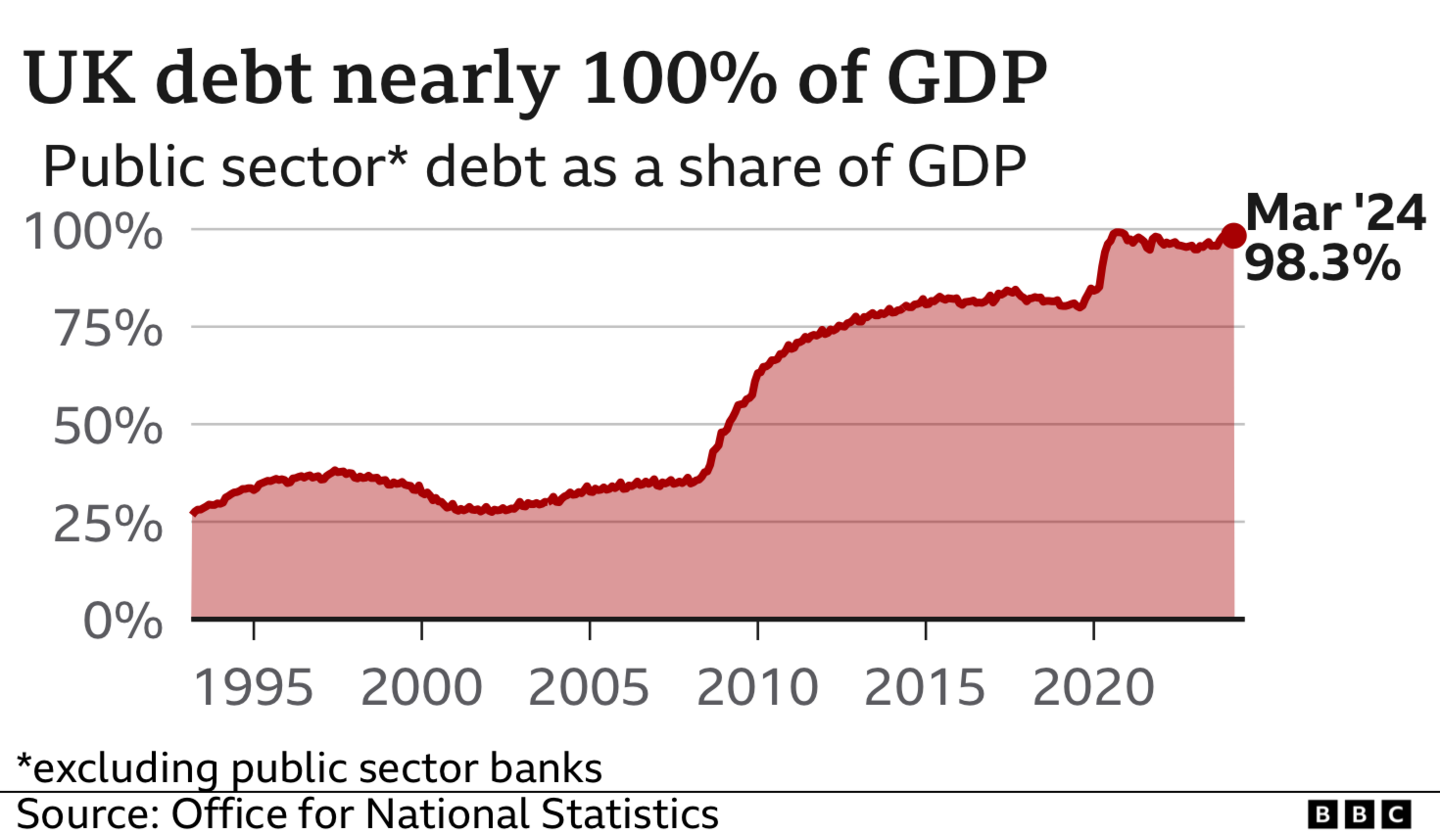UK borrowing casts doubt on pre-election tax cut prospects
- Published
- comments

Higher than expected government borrowing has reduced the scope for pre-election tax cuts, analysts say.
Government borrowing - the difference between spending and tax income - was £120.7bn in the year to March, the Office for National Statistics said.
While this was lower than the previous year, it was £6.6bn more than the government's forecaster had predicted.
The government cut National Insurance in March and there has been talk it could trim taxes again in the autumn.
However, Ruth Gregory, deputy chief UK economist at Capital Economics, said: "If the chancellor was hoping March's figures would provide more scope for tax cuts at a fiscal event later this year, he will have been disappointed."
In addition to the higher borrowing, she noted that government interest payments could be larger than expected given that interest rates are no longer forecast to fall as quickly as previously hoped. This would reduce the headroom for the government to meet its self-imposed spending rules.
Cara Pacitti, senior economist at the Resolution Foundation, the think tank focused on lower income households, said that the latest figures suggested there were "no signs of extra wriggle room" for any pre-election Budget.
The government's independent forecasting body, the Office for Budget Responsibility (OBR), had predicted that borrowing over the year would be £114.1bn.
A general election has to be held before the end of January 2025, and there has been speculation the government will try to cut taxes again later this year before voters head to the polling stations.
Last week, Chancellor Jeremy Hunt told the Financial Times, external that he would like to cut taxes in the autumn "if we can".
The chancellor reduced National Insurance by 2p in the pound in the spring Budget following a 2p cut announced in last year's Autumn Statement. The OBR estimated that each cut will cost the government nearly £10bn.
Rob Wood, chief UK economist at Pantheon Macroeconomics, said he still expected the chancellor to cut taxes again before an election.
However, he added that the next government would "face a tricky choice between raising taxes to fix creaking public services or holding the line on the chancellor's recent tax cuts".
"We suspect whoever the next government is will end up pushing through at least some tax rises to balance the books."

Jessica Barnaby, ONS deputy director for public sector finances, said that over the past year government spending was up by about £58bn "with increased spending on public services and benefits outstripping large reductions in interest payable and energy support scheme costs".
"But with public sector income up £66bn, overall, the deficit still fell," she said.
The ONS also noted that these are the initial estimates of public sector finances for last financial year, and figures will be revised over the coming months.
Borrowing in March alone was £11.9bn, which was £4.7bn less than a year earlier but still higher than analysts had expected.
Total debt - which is the overall amount of money owed by the government that has built up over years - was £2.7 trillion at the end of March.
That is the equivalent of 98.3% of the size of the UK's economy as measured by gross domestic product (GDP), remaining at levels last seen in the early 1960s, the ONS said.
A Treasury spokesman said: "Debt increased in recent years because we rightly protected millions of jobs during Covid and paid half of people's energy bills after Putin's invasion of Ukraine sent bills skyrocketing."
He added that the government "must stick to the plan to get debt falling".
Liberal Democrat Treasury spokesperson Sarah Olney MP said: "Years of Conservative chaos has left Britain with spiralling taxes and mortgages, all whilst borrowing remains out of control. This is another damning blow for the Conservative government's economic credibility."
Related topics
- Published17 April 2024

- Published16 April 2024

